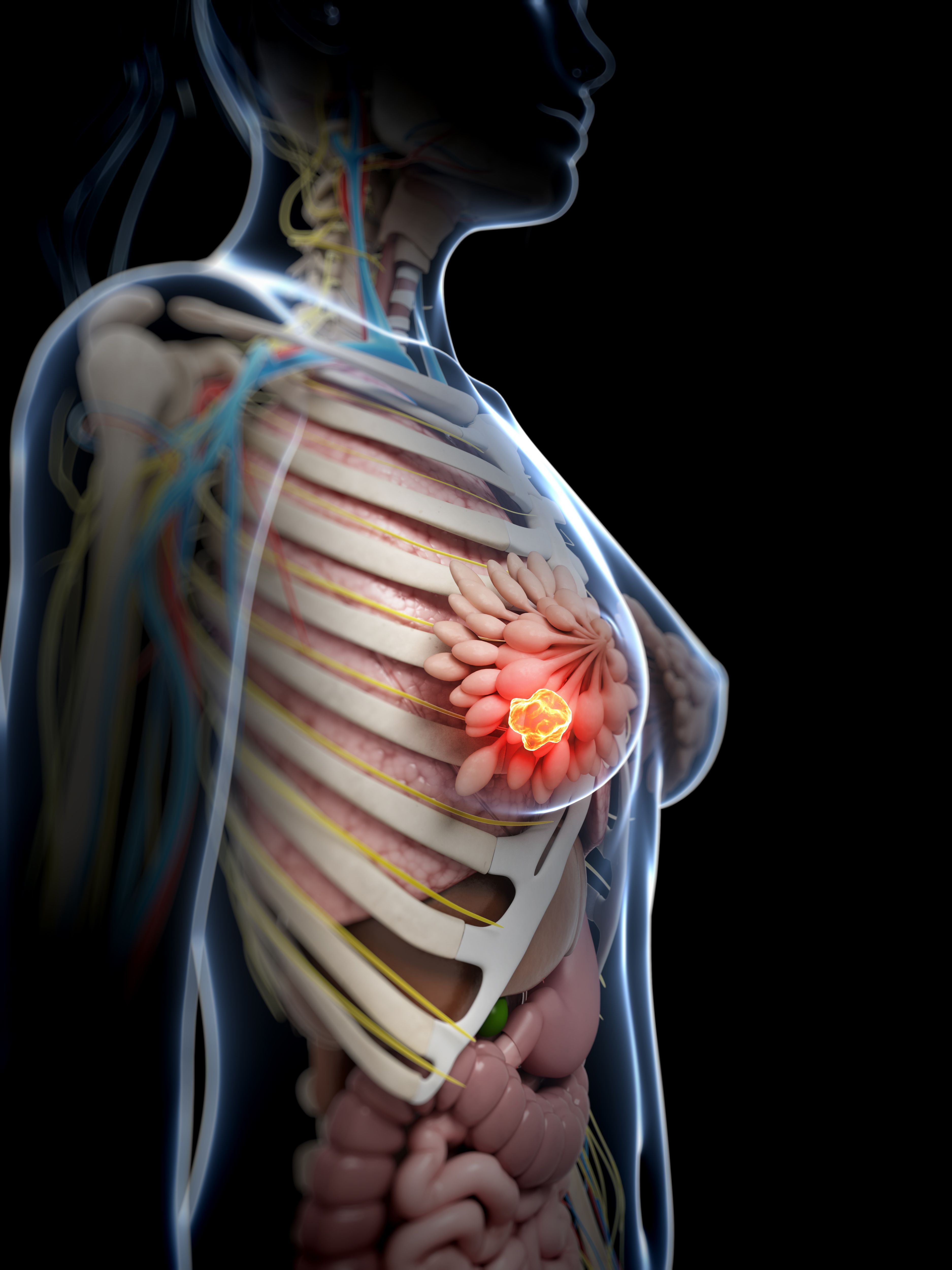- Center on Health Equity & Access
- Clinical
- Health Care Cost
- Health Care Delivery
- Insurance
- Policy
- Technology
- Value-Based Care
Destiny-Breast06 Results Offer New Hope for Patients With HR-Positive, HER2-Low Metastatic Breast Cancer
Trial results from DESTINY-Breast06 indicate the effectiveness of fam-trastuzumab deruxtecan-nxki in delaying disease progression for patients with hormone receptor (HR)–positive and HER2-low metastatic breast cancer who had prior endocrine therapy.
3D rendered graphic of breast cancer | Image Credit: Sebastian Kaulitzki - stock.adobe.com

The DESTINY-Breast06 phase 3 trial found fam-trastuzumab deruxtecan-nxki (Enhertu) demonstrated clinically meaningful progression-free survival (PFS) improvement in patients with hormone receptor (HR)–positive, HER2-low metastatic breast cancer following 1 or more forms of endocrine therapy, according to high-level results released by AstraZeneca and Daiichi Sankyo.1
In DESTINY-Breast06, patients with HR-positive, HER2-low (immunohistochemistry 1+ or 2+/in situ hybridization negative) metastatic breast cancer treated with trastuzumab deruxtecan experienced a statistically significant and clinically meaningful improvement in PFS compared with standard-of-care chemotherapy.
The trial examined the prespecified subgroup analysis in PFS to identify clinically meaningful improvements consistent between patients with HER2-low and HER2-ultralow expressions. Trastuzumab deruxtecan expressed an early trend toward overall survival (OS) improvements versus standard of care chemotherapy in patients with HER2-low metastatic breast cancer, including the overall trial population.
Prior to DESTINY-Breast06, the randomized phase 3 DESTINY-Breast04 trial showed trastuzumab deruxtecan prolonged PFS and OS in patients with HER2-low unresectable and/or metastatic breast cancer.2 The DESTINY-Breast04 findings supported changing the way laboratories reported HER2 results. The results of Destiny-Breast04 were first released at the 2022 annual meeting of the American Society of Clinical Oncology and immediately called game changing.3
Debra Patt, MD, PhD, MBA, executive vice president of public policy and strategic initiatives at Texas Oncology, spoke with The American Journal of Managed Care® in 2022 about what DESTINY-Breast04 means for managed care settings.3 "In contrast to chemotherapy, if you give this antibody-drug conjugate, trastuzumab deruxtecan, you can see both a progression-free and overall survival benefit, whether patients are hormone receptor–positive or hormone receptor–negative.”
Results from DESTINY-Breast04 made waves in breast cancer care, especially after receiving a standing ovation at ASCO.3 There was a 50% improvement rate in PFS with a 36% improvement in OS when compared with chemotherapy. Patient outcomes were consistent across subgroups, including those previously treated with CDK4/6 inhibitors.
Just 2 months after the results were presented, trastuzumab deruxtecan received a rapid approval to treat HER2-low breast cancer.5
DESTINY-Breast06 builds on those results from DESTINY-Breast04, based on more than just patients with HER2-low advanced breast cancer.
“DESTINY-Breast06 shows that Enhertu could become a new standard of care for patients with HER2-low and HER2-ultralow metastatic breast cancer following one or more lines of endocrine therapy. These data underscore the potential for treatment with Enhertu across the spectrum of HR-positive breast cancer, further redefining the treatment of metastatic breast cancer,” said Susan Galbraith, executive vice president, Oncology R&D, AstraZeneca.1
An estimated 60% to 65% of HR-positive and HER2-negative breast cancers are HER2-low. Additionally, around 25% may be HER2-ultralow breast cancer. Typically, endocrine therapies are widely used in early treatment for HR-positive metastatic breast cancer but after 2 lines of treatment, further efficacy from endocrine therapy is often limited. Following endocrine therapy, the current standard of care is chemotherapy, often associated with poor response rates and harsh outcomes.
Patients with breast cancer are recommended 5.4 mg/kg dosages of trastuzumab deruxtecan administered intravenously once every 3 weeks (21 day cycle) until disease progression or unacceptable toxicity.6
The most common adverse events included nausea (73%), decreased white blood cell count (70%), decreased hemoglobin (66%), decreased neutrophil count (63%), decreased lymphocyte count (58%), fatigue (56%), decreased platelet count (48%), increased aspartate aminotransferase (47%), increased alanine aminotransferase (43%), and vomiting (40%).
Overall, the safety profile of trastuzumab deruxtecan was consistent with previous breast cancer clinical trials, without any newly signals identified.
References
1. Enhertu (fam-trastuzumab deruxtecan-nxki) demonstrated statistically significant and clinically meaningful improvement in progression-free survival in HR-positive, HER2-low metastatic breast cancer following one or more lines of endocrine therapy in DESTINY-Breast06 Phase III trial. AstraZeneca. April 29, 2024. Accessed April 30, 2024. https://www.astrazeneca-us.com/media/press-releases/2024/enhertu-fam-trastuzumab-deruxtecan-nxki-demonstrated-statistically-significant-and-clinically-meaningful-improvement-in-progression-free-survival-in-hr-positive-her2-low-metastatic-breast-cancer-following-one-or-more-lines-of-endocrine-therapy-in-destiny-breast06-phase-iii-trial.html
2. DESTINY-Breast04 establishes trastuzumab deruxtecan as a new standard of care for HER2-low metastatic breast cancer. ASCO Daily News. June 6, 2022. Accessed April 30, 2024. https://dailynews.ascopubs.org/do/destiny-breast04-establishes-trastuzumab-deruxtecan-new-standard-care-her2-low
3. Caffrey M. Trastuzumab deruxtecan cuts risk of disease progression or death by 50% for patients with HER2-low metastatic breast cancer. June 5, 2022. Accessed April 30, 2024. https://www.ajmc.com/view/trastuzumab-deruxtecan-cuts-risk-of-disease-progression-or-death-by-50-for-patients-with-her2-low-metastatic-breast-cancer
4. Klein HE. Debra Patt, MD, PhD, MBA: DESTINY-Breast04 realizes a promise of modern cancer therapy. The American Journal of Managed Care. February 21, 2023. Accessed April 30, 2024. https://www.ajmc.com/view/debra-patt-md-phd-mba-destiny-breast04-realizes-a-promise-of-modern-cancer-therapy
5. Caffrey M. Trastuzumab deruxtecan wins rapid approval for HER2-low breast cancer. The American Journal of Managed Care. August 6, 2022. Accessed May 1, 2024. https://www.ajmc.com/view/trastuzumab-deruxtecan-wins-rapid-approval-for-her2-low-breast-cancer
6. FDA grants accelerated approval to fam-trastuzumab deruxtecan-nxki for unresectable or metastatic HER2-positive solid tumors. US Food & Drug Administration. April 5, 2024. Accessed May 1, 2024. https://www.fda.gov/drugs/resources-information-approved-drugs/fda-grants-accelerated-approval-fam-trastuzumab-deruxtecan-nxki-unresectable-or-metastatic-her2
